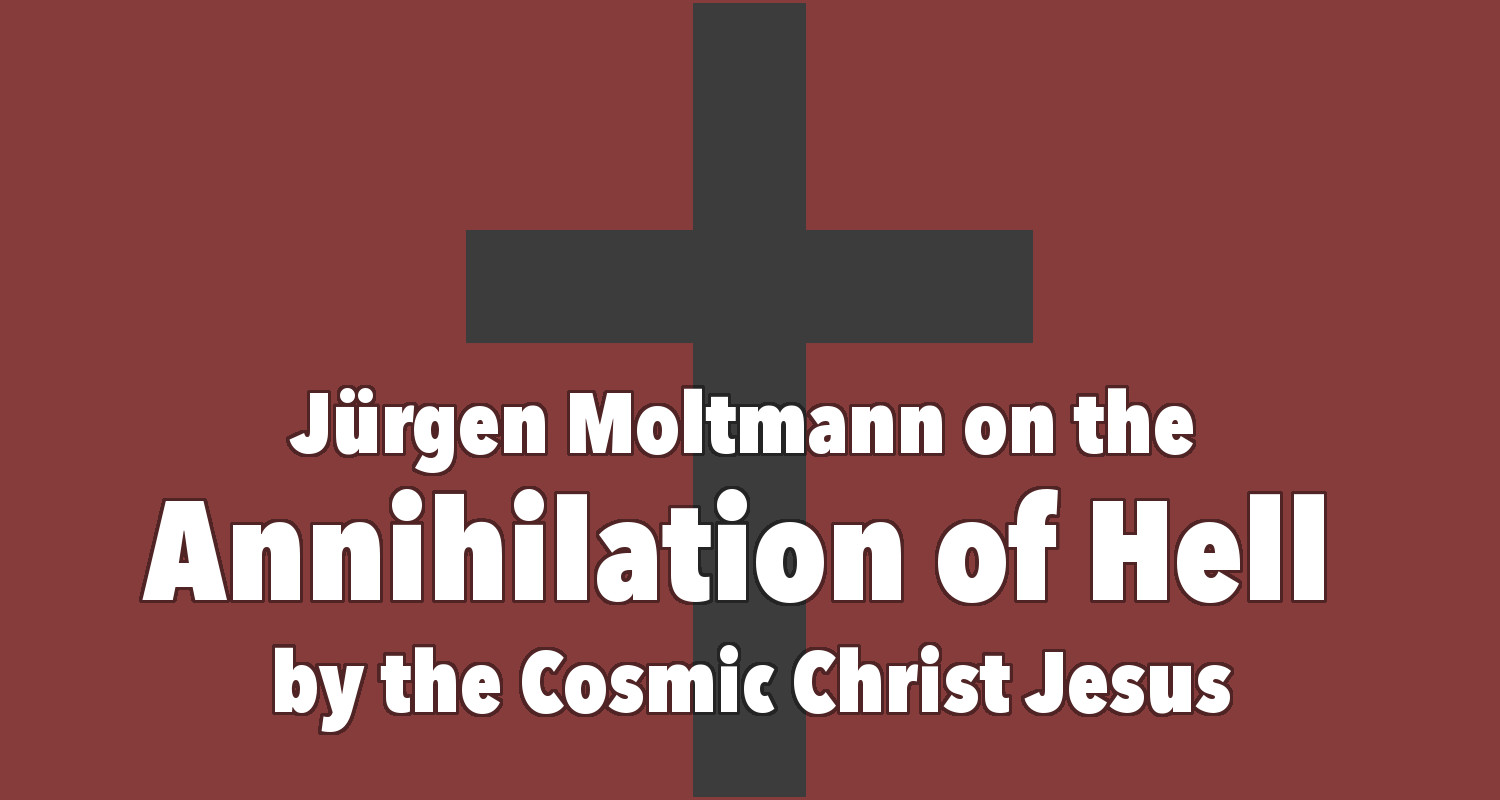 This week, a celebrity pastor equated the love of Jesus with unending punishment in hell, and justified his comment with arguments such as counting the number of biblical references to Jesus (without any respect to author or intention, and as if the number of verses a word occurs in the bible establishes its importance). As a course correction, rather than a rebuttal, I recommend Jürgen Moltmann's theology of hell as a way out of the quagmire of evangelical misconceptions regarding hell (such as eternal conscious torment). I've previously shared why Jürgen Moltmann believes that this logic of hell is inhumane and extremely atheistic. In this post, I'll explain why Moltmann says that the crucifixion of Jesus has resulted in the annihilation of hell. (Karl Barth says the same thing too).
This week, a celebrity pastor equated the love of Jesus with unending punishment in hell, and justified his comment with arguments such as counting the number of biblical references to Jesus (without any respect to author or intention, and as if the number of verses a word occurs in the bible establishes its importance). As a course correction, rather than a rebuttal, I recommend Jürgen Moltmann's theology of hell as a way out of the quagmire of evangelical misconceptions regarding hell (such as eternal conscious torment). I've previously shared why Jürgen Moltmann believes that this logic of hell is inhumane and extremely atheistic. In this post, I'll explain why Moltmann says that the crucifixion of Jesus has resulted in the annihilation of hell. (Karl Barth says the same thing too).
Hell is real, and it is what Jesus Christ experienced for us all, or as Karl Barth said that Jesus was the rejected one who was rejected for all. Moltmann explains that the resurrection of Jesus has overcomed death, and the hell that Jesus experienced on the cross is for us all. In the resurrection, eternal life has been realized through Jesus Christ, and this new life isn't for Jesus or Christians alone (1 John 2:2), but for the entire world (Romans 8:22-23), and will one day result in the death of death, and a new earth (Rev 21:1) in the new creation. Karl Barth reminded us of the fact that the early creeds only mentioned belief in eternal life, and not in eternal death or hell. So Moltmann argues that the resurrection of Jesus has resulted in the annihilation of hell, so we should expect that Jesus would proclaim serious warnings about hell frequently in his ministry, because Jesus would destroy death and hell through the cross, and this is why the ascension of Jesus is commonly known as the harrowing of hell! Paul confirms this when he says that death is the last enemy to be defeated (1 Cor 15:26). (I'm including lots of biblical references as an aid to my readers this time because proponents of hell often resort to proof-texting.)
In the following quote, Moltmann makes an important point that the final judgment isn't for the sake of enslaving anyone into torment, but to correct things that are wrong. Even earthly and human judges exist to set the world right, and correct things that are wrong, and they do not exist for the purpose of torturing anyone. A judge who desires to torture people who appear before him in his court would be a wicked judge, and to understand hell as the love of Jesus is to make God complicit with violence, and calls into question the goodness of God. So the final judgement, as Moltmann quotes Paul, will occur for putting a final end to death, which will annihilate all hells in this world or the world to come, and to establish the love of Jesus in a cosmic sense, such that not only some of humanity will be made right by the cross of Christ, but all of humanity, and the entire cosmos. Therefore, Jesus Christ is the cosmic Christ that annihilates death, and hell and becomes "all in all" (1 Cor 15:28).
In the foreword to The Annihilation of Hell, Jürgen Moltmann explains the annihilation of hell by the cosmic Christ:
I then took up an old desire of Karl Barth and Helmut Gollwitzer, namely to reform the doctrine of the Last Judgment from the perspective of the crucified one who will come to judge the living and the dead. Here I had the Old Testament notion of "divine judging" for help. According to Psalm 96, God will come to judge the earth, and the earth will rejoice and the fields will make merry. In this instance, "judge" means to raise up, set straight, heal, and bring to life. How could it be otherwise in the Christian anticipation of God's Final Judgment and coming kingdom! In fact the so-called "Final Judgment" is penultimate; what is truly final is the new, eternal creation in which God becomes "all in all" (1 Cor 15:28).
At this point another thought came to me: With the forgiveness of sins and the overcoming of death, God is concerned primarily with the expulsion of the godless powers of evil, of sin, of death, and of Hell from his beloved creation. Isn't our question as to whether all or only a few will be saved not an anthropocentric and in many cases even a selfish one? For God, it is about God's glorification of all of his creatures. The salvation of the new humanity is only a part of this. If we look to the glory of God, then the universalism and particularism of human salvation are relativized. The "annihilation of Hell" is an action of the cosmic Christ, whose reign is universal. "Universal salvation" is only the human part of the "salvation of the universe." [1]
Source:
1. Jürgen Moltmann, Foreword, The Annihilation of Hell: Universal Salvation and the Redemption of Time in the Theology of Jürgen Moltmann, Authentic Media (Koorong UK: 2013)
Related: Annihilation of Hell, Death, Hell, Jürgen Moltmann



Leave a comment